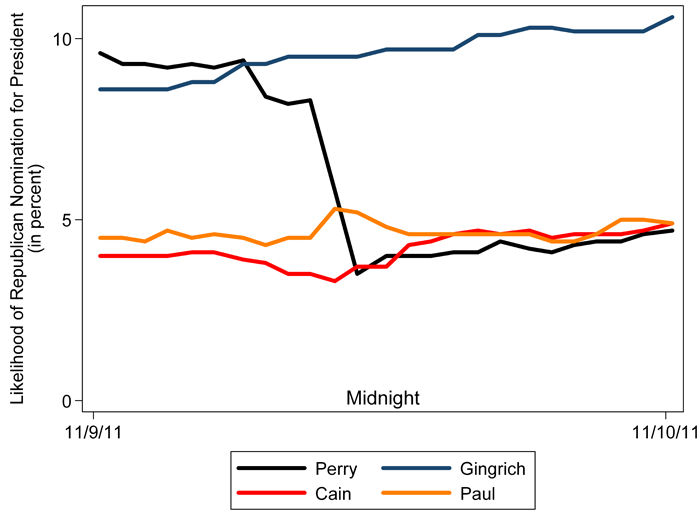Perry plummets in prediction markets after debate gaffe
In some ways it was no big deal. Rick Perry couldn't remember the third of three government agencies he would shut down if elected.
But this was live during CNBC's Republican debate Wednesday night, and Gov. Perry didn't handle his senior moment with grace. He finally admitted, "No, I can't [remember], oops." In a pre-YouTube era, or for a candidate not already typecast as a poor debater, the gaffe may have been overlooked.
Not this time.
Traders on prediction markets who earn their keep handicapping the election punished Perry instantly, sending his chances of winning the GOP nomination from 8.3 percent to 3.8 percent in less than two hours. (His chances have since modestly recovered to 4.4 percent as of 10:30 a.m. ET on Thursday.) Prediction markets are stock exchanges for political candidates, and they react just as brutally to bad news as their financial counterparts.
Who benefited from Perry's drop? On this question the two major prediction markets, Intrade and Betfair, disagree. Of the four percentage points Perry lost between 8:30 p.m. and 10:30 a.m., Betfair reassigned roughly one percent each to Herman Cain, Newt Gingrich, Ron Paul, and Mitt Romney. On Intrade, three of the four percent went to Romney, with one percent going to Cain, suggesting the anyone-but-Romney feeling held by some Republicans may be ending. (Immediately after the debate, Paul inexplicably rose by almost two percent on Intrade, but has since settled back to where he was pre-debate.)
In today's connected world, even the smallest flub risks being analyzed, ridiculed, and rebroadcast. The New York Times election quant Nate Silver blasted a representative tweet to his 108,645 followers: "Like Rick Perry, I'm speechless." The resonance is strongest when the mistake fits with an existing media storyline, in this case a string of less-than-stellar debate performances starting with Perry's first.
Last week, as Herman Cain wrestled with accusations of past misconduct, we saw that avoiding major missteps, even decades prior to running, can be essential for a political campaign. On Wednesday, we saw a perfect example of how getting the little things right can be just as important.



